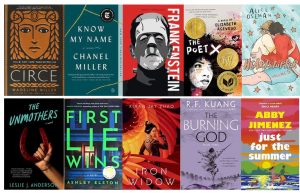Last week was four days of the typical academic drudgery with a beautiful island of rest in the middle. That blessed oasis was the Celebration of Student Scholarship, or CoSS. I went to three sessions and an evening recital and enjoyed them all immensely. While they were all worth an article at least, I’d like to write about one, specifically. Brianna Drevlow’s presentation of her independent study on Mädchenlied (in German- “maiden song”) was one I knew I’d be attending from the moment I heard about it.
To give a quick history gleaned from the presentation, Mädchenlied are art songs written by German composers of the Romantic era. Johannes Brahms, Robert Schumann, and Franz Schubert were the three composers with the most extensive repertoire of Mädchenlied. They chose texts that were written about women and women’s experiences and then set them to music, to be performed by women. Virtually all themes were spinning cloth, achieving marriage, flowers in the spring, etc.
Brianna pointed out the problem you may have noticed already, Dear Reader. The texts were written by men. They were chosen by men. They were set to music by men. And they were meant to represent women.
Brianna was fair, she was factual. There was no feminazi rant, and no I-hate-men brainwashing. She even went so far as to explain that this patronizing attitude towards females, especially in music, which was vastly male-dominated, was culturally appropriate at the time. These men were not intentionally misrepresenting women or women’s issues. At the risk of sounding glib, I would go so far as to say that these guy probably thought they were throwing women a bone. I doubt there was any malicious intent, and Brianna was in no way vilifying these specific men, nor men in general. She made it clear that, while these pieces are still objectively well-written and legitimate musical ideas, when performing them, we ought to have a conscious sense of what we’re singing about and where it came from, as well as carry the constant weight of artistic responsibility to what are now quite sensitive topics. I silently applauded her for getting her point across tactfully and truthfully without stepping on anyone’s toes.
But when Brianna closed and asked for questions, someone raised their hand. In the back, a man re-crossed his legs, folded his arms and began with “Looking around me, I notice that most people in this room are women…” He went on to protest Brianna’s treatment of the composers, complaining that she was painting them as sexist puppeteers of women. He spoke at length of how this was unfair, and mentioned that men are not, in fact, naïve to the experiences of women. By the time he finished, I could feel the collective blood pressure of the room increase- not out of anger or indignation, but rather in response to the tangible tension hanging in the air between the stage and the back of the hall, where the man had chosen to sit. The ball was in Brianna’s court, and she was up to bat for an incredibly large team. Unfair as it was, whatever she said next would characterize and speak for all feminists, at least in the eyes of that exact audience. Personally, I’m glad she was on the plate.
Brianna, cool and confident as ever, explained that, while puppeteering may seem like an unnecessarily extreme and condemning term, it truly was what these men were doing. She reiterated that she wasn’t criminalizing these men, and that, according to societal norms at the time, they likely believed they were doing women a favor. At his immediate rebuttal, she added that, while they may not have been intentionally maligning women, they certainly weren’t intentionally giving them space to use their voices and express themselves. The man eventually resigned her to her opinion and himself to his. There were no more questions.
Dear Reader, you are entitled to your opinion. That man is entitled to his. But none of us have the right to the oppression, degradation, or demeaning of others. It’s not just about women. It’s about all of us working together to better ourselves and the rest of humanity (Kum-Ba-Yah, am I right?).
I spoke to Brianna later, and after the customary congratulations, we discussed how her presentation regarded not only women’s rights, but was also relevant to every individual who doesn’t feel safe or adequately represented. She left me (and I will leave you) with this quote:
“Regardless of how one person identifies, in terms of gender, sexuality, religious belief, political stance, or anything else, it is important that we are mindful and respectful of what others have to say. That was the whole point of my presentation.”





Be First to Comment